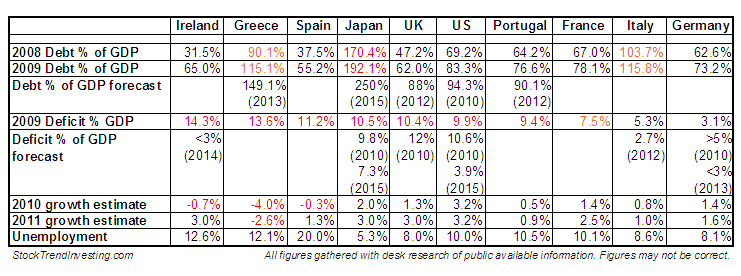Economy
Austerity Haircut for Shareholders and Employees of European Banks
Submitted by Van Beek on September 8, 2011 - 16:29|
Who is getting the austerity haircut because of the lousy job done by the European banks?
Suppose you run a business. Your business is to lend money to those who pay it back and to charge an interest for that. Your job is to balance risk and reward and to make sure that you get a good total return on investment.
Now you are a European bank and you have lent money to Greece. You bought their bonds. |
What is ahead for the US Dollar given the large Current Account Deficit
Submitted by Van Beek on September 30, 2010 - 06:35The Current Account deficit for the US is at this moment $123 billion per quarter and 3.3% of GDP. This is less than the 6% in 2006 but still at a level that most economists consider to be unsustainable in the long term. The decline is probably caused by the economic situation and could be temporary. So, what does this mean and what is ahead for the US?
In this article we focus on what the consequences could be for the US given its large Current Account deficit and the factors that are driving this deficit.

Four Possible Drivers for Large Current Account Deficits like in the US
Submitted by Van Beek on September 29, 2010 - 08:19Large Current Account deficits are rarely a positive symptom. They reflect often an underlying economic situation that can be unsustainable. The US has a large Current Account deficit. What are the possible drivers for such a large deficit?
This article focuses on the economic symptoms or situations that could lead to a large Current Account deficit.

How a Current Account Surplus can lead to a Weak Chinese Currency
Submitted by Van Beek on September 27, 2010 - 06:57Central Banks have few options to manage the currency in case of a Current Account deficit. Such a deficit is financed by a Capital Account Surplus. This can be done via higher incoming investments or lower foreign currency reserves. In case of Current Account surplus, the Central Bank will have the option to keep its currency artificial low in the eyes of the rest of the world. How does that work?
This article focuses on the impact of a deficit or surplus of the Current Account on the Capital Account and the domestic currency.

The Capital Account and Reserve Account: Money Flows for Capital Investments
Submitted by Van Beek on September 24, 2010 - 03:17Deficits and surpluses in nations Current Account are financed and spent in it Capital Account. What is this Capital Account? In the broadest definition, the Capital Account is the difference between money flowing in and out of the country as a result of capital investments. The Reserve Account is a part of the Capital Account.

This article focuses on the Capital Account and Reserve Account. We will clarify some of the different definitions around Capital Account and explain what both Accounts imply.
The Balance of Payments and Current Account Deficits and Surpluses
Submitted by Van Beek on September 22, 2010 - 05:51The Current Account is rarely exactly balanced. What does it mean when there is a Current Account surplus or deficit? These Current Account deficits and surpluses need to be financed and spend. This is happening in the Capital Account as a result of the Balance of Payments.
Read here our next post on why is the Japanese yen so strong.

The Current Account and how Money Flows
Submitted by Van Beek on September 21, 2010 - 15:29Do you understand how Public Deficits, Foreign Debts, trends in Currency Exchange Rates and Current Account Deficits impact the investment opportunities in the different markets around the world? To do so, a sound understanding is required of each of these economic concepts and how they interact with each other.

This article is a first in a series of five that explains the economic concepts of Current Account, Capital Account and Reserve Account and how they relate with foreign debts and public deficits. If you are interested to get an understanding of how the economy works, how money flows between nations and its impact on currency trends and the economic well-being of nations, please read on.
What to do with Bonds Bubble, Inflation or Deflation and No Clear Trends in the Stock Markets
Submitted by Van Beek on August 29, 2010 - 05:48What shall anybody who wants to invest his or her money now do when stock markets do not move in any specific direction, the recovery is uncertain and interest rates on savings accounts are still incredible low? I like to have a simple answer. The simple answer is not there yet, but here is some food for thought.

To try to find simple investing strategies that work when there are no clear trends in the stock markets, I am reading and looking what can be done with bonds.
At the same time, a disaster scenario would be where stocks do not move in any long term trend, savings accounts do not provide any substantial interest and inflation starts to soar, eating away all your savings.
Factors contributing to Economic Growth and Causes for Recession and Economic Crisis
Submitted by Van Beek on August 25, 2010 - 10:33Do you also like to have a simple graphic overview of the factors contributing to economic growth and the causes for recession and economic crisis?
The daily economic news does not provide you with this overview. You hear statements about double-dips, a looming recession or even depression, huge growth and surplusses in China, a credit crisis, rising currencies, deleveraging of debts and more of this. Let’s have a look at the fundamental economic patterns behind all this.
Debt or Deficit: are we into trouble compared to other countries?
Submitted by Research on June 28, 2010 - 11:51




